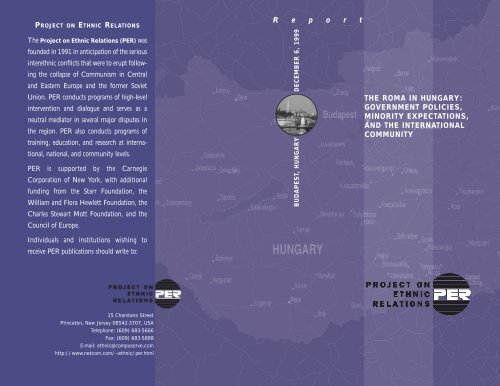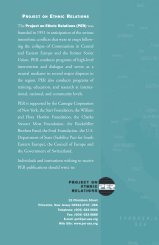Government Policies, Minority Expectations and the International ...
Government Policies, Minority Expectations and the International ...
Government Policies, Minority Expectations and the International ...
Create successful ePaper yourself
Turn your PDF publications into a flip-book with our unique Google optimized e-Paper software.
PROJECT ON ETHNIC RELATIONS<br />
The Project on Ethnic Relations (PER) was<br />
founded in 1991 in anticipation of <strong>the</strong> serious<br />
interethnic conflicts that were to erupt following<br />
<strong>the</strong> collapse of Communism in Central<br />
<strong>and</strong> Eastern Europe <strong>and</strong> <strong>the</strong> former Soviet<br />
Union. PER conducts programs of high-level<br />
intervention <strong>and</strong> dialogue <strong>and</strong> serves as a<br />
neutral mediator in several major disputes in<br />
<strong>the</strong> region. PER also conducts programs of<br />
training, education, <strong>and</strong> research at international,<br />
national, <strong>and</strong> community levels.<br />
PER is supported by <strong>the</strong> Carnegie<br />
Corporation of New York, with additional<br />
funding from <strong>the</strong> Starr Foundation, <strong>the</strong><br />
William <strong>and</strong> Flora Hewlett Foundation, <strong>the</strong><br />
Charles Stewart Mott Foundation, <strong>and</strong> <strong>the</strong><br />
Council of Europe.<br />
Individuals <strong>and</strong> institutions wishing to<br />
receive PER publications should write to:<br />
R e p o r t<br />
BUDAPEST, HUNGARY DECEMBER 6, 1999<br />
THE ROMA IN HUNGARY:<br />
GOVERNMENT POLICIES,<br />
MINORITY EXPECTATIONS,<br />
AND THE INTERNATIONAL<br />
COMMUNITY<br />
15 Chambers Street<br />
Princeton, New Jersey 08542-3707, USA<br />
Telephone: (609) 683-5666<br />
Fax: (609) 683-5888<br />
E-mail: ethnic@compuserve.com<br />
http://www.netcom.com/~ethnic/per.html
THE ROMA IN HUNGARY:<br />
GOVERNMENT POLICIES,<br />
MINORITY EXPECTATIONS,<br />
AND THE INTERNATIONAL<br />
COMMUNITY<br />
BUDAPEST, HUNGARY<br />
DECEMBER 6, 1999<br />
©Copyright 2000 by Project on Ethnic Relations
TABLE OF CONTENTS<br />
Preface 1<br />
Note on Terminology 3<br />
Introduction 4<br />
The <strong>International</strong> Scene 5<br />
<strong>Government</strong>al Measures in Hungary 9<br />
The Perspective of <strong>the</strong> Gypsy Self-<strong>Government</strong> 12<br />
The Contributions of Experts 13<br />
Conclusions <strong>and</strong> Suggestions 17<br />
List of Participants 18<br />
O<strong>the</strong>r PER Publications 21
PREFACE<br />
The government of Hungary has launched a major program to improve<br />
<strong>the</strong> situation of Romani communities. The Roma are recognized as one<br />
of 13 historic ethnic minorities in Hungary’s Rights of National <strong>and</strong><br />
Ethnic Minorities Act. In 1993, Romani communities were given <strong>the</strong><br />
right to establish <strong>the</strong>ir own self-government. By 1997 <strong>the</strong> former government<br />
developed a medium-term strategy for improving <strong>the</strong> situation<br />
of <strong>the</strong> Roma. The present government has been continuing <strong>the</strong>se efforts:<br />
<strong>the</strong>y reviewed <strong>the</strong> medium-term strategy <strong>and</strong> created an Interministerial<br />
Committee on Roma, including Romani representation to oversee <strong>and</strong><br />
coordinate <strong>the</strong> implementation of <strong>the</strong> government program. Meanwhile,<br />
<strong>the</strong> Roma have become more politically active <strong>and</strong> are increasingly aware<br />
of <strong>the</strong>ir rights.<br />
Never<strong>the</strong>less, <strong>the</strong> Roma in Hungary continue to suffer greatly from low<br />
social status <strong>and</strong> from discrimination. Some Roma charge that <strong>the</strong> government<br />
is not serious about carrying out its own medium-term strategy<br />
<strong>and</strong> cite what <strong>the</strong>y consider to be insufficient financial resources devoted<br />
to it. They have also questioned <strong>the</strong> effectiveness of <strong>the</strong>se programs <strong>and</strong><br />
policies in actually improving life in Romani communities.<br />
One of <strong>the</strong> conditions for Hungary’s EU accession is improvement in <strong>the</strong><br />
situation of <strong>the</strong> Hungarian Roma. The government’s position is that its<br />
programs <strong>and</strong> policies do provide a basis for solutions, <strong>and</strong> that ministries<br />
have already been delegated specific tasks concerning Romani education,<br />
employment, <strong>and</strong> housing. <strong>Government</strong> officials claim that implementation<br />
of <strong>the</strong>se tasks has begun, although <strong>the</strong>y concede that financial<br />
constraints mean slower progress than <strong>the</strong>y would like.<br />
On December 6, 1999 a seminar was held in Budapest, Hungary organized<br />
by <strong>the</strong> Project on Ethnic Relations in cooperation with <strong>the</strong><br />
National Gypsy Self-<strong>Government</strong> in Hungary. Titled, “The Roma in<br />
From left to right: Csaba Hende, Florian<br />
Farkas, Allen Kassof. Michael Lake<br />
not shown.<br />
From left to right: Toso Doncsev, Antal<br />
Heizer (back row center), Jeno Kaltenbach.<br />
1
Hungary: <strong>Government</strong> <strong>Policies</strong>, <strong>Minority</strong> <strong>Expectations</strong>, <strong>and</strong> <strong>the</strong><br />
<strong>International</strong> Community,” <strong>the</strong> seminar provided an opportunity for<br />
Romani leaders <strong>and</strong> government officials to assess <strong>the</strong> government’s medium-term<br />
program for <strong>the</strong> Roma <strong>and</strong> to consider how to streng<strong>the</strong>n it.<br />
The discussion was valuable in several respects. First, it allowed Roma<br />
<strong>and</strong> government officials to share <strong>the</strong>ir perspectives on programs <strong>and</strong><br />
policies toward <strong>the</strong> Roma. Second, it reinforced <strong>the</strong> shared desire of<br />
Romani leaders <strong>and</strong> government officials to ameliorate <strong>the</strong> situation of<br />
<strong>the</strong> Roma. Third, it emphasized that simultaneous improvements are<br />
needed at national, local <strong>and</strong> international levels. Finally, participants<br />
offered suggestions about how to reach <strong>the</strong>se goals.<br />
This report was written by Dr. Ferenc Melykuti, director of PER’s office<br />
in Budapest, Hungary <strong>and</strong> edited by Robert A. Feldmesser, PER’s Senior<br />
Editor, <strong>and</strong> PER staff. The participants in <strong>the</strong> meeting did not have an<br />
opportunity to review <strong>the</strong> text, for which PER assumes full responsibility.<br />
A NOTE ON TERMINOLOGY<br />
Gypsy is an English term used to denote ethnic groups formed by <strong>the</strong> dispersal<br />
of commercial, nomadic, <strong>and</strong> o<strong>the</strong>r groups from within India,<br />
beginning in <strong>the</strong> tenth century, <strong>and</strong> <strong>the</strong>ir mixing with European <strong>and</strong><br />
o<strong>the</strong>r groups during <strong>the</strong>ir diaspora. The terms Gypsy <strong>and</strong> <strong>the</strong> several<br />
European variants of Tsigan are considered by many to be pejorative <strong>and</strong><br />
are often replaced by <strong>the</strong> more neutral term Rom. However, because<br />
Gypsy is widely used in Hungary, <strong>and</strong> included in <strong>the</strong> official title of <strong>the</strong><br />
National Gypsy Self-<strong>Government</strong>, <strong>the</strong> term Gypsy in this text is only used<br />
when mentioning National Gypsy Self-<strong>Government</strong>. In all o<strong>the</strong>r cases, <strong>the</strong><br />
term Roma refers to <strong>the</strong> group as a whole, Rom refers to a member of <strong>the</strong><br />
group, <strong>and</strong> Romani is <strong>the</strong> corresponding adjective.<br />
Allen H. Kassof, President<br />
Livia Plaks, Executive Director<br />
Princeton, New Jersey<br />
July 2000<br />
From left to right: Andrzej Mirga, Bela Osztojkan,<br />
Florian Farkas.<br />
2 3
INTRODUCTION<br />
The Project on Ethnic Relations (PER), in cooperation with <strong>the</strong><br />
National Gypsy Self-<strong>Government</strong> in Hungary, held an international conference<br />
at <strong>the</strong> Teleki Laszlo Foundation in Budapest on December 6,<br />
1999, on <strong>the</strong> topic, “The Roma in Hungary: <strong>Government</strong> <strong>Policies</strong>,<br />
<strong>Minority</strong> <strong>Expectations</strong>, <strong>and</strong> <strong>the</strong> <strong>International</strong> Community.” The meeting<br />
considered <strong>the</strong> Hungarian government’s program for <strong>the</strong> improvement of<br />
<strong>the</strong> situation of <strong>the</strong> Roma. Participants assessed <strong>the</strong> potential of <strong>the</strong> program<br />
<strong>and</strong> discussed areas that need fur<strong>the</strong>r attention. The participants<br />
in <strong>the</strong> conference were leaders <strong>and</strong> experts from <strong>the</strong> National Gypsy Self-<br />
<strong>Government</strong> <strong>and</strong> <strong>the</strong> Romani community, <strong>the</strong> Hungarian government’s<br />
ombudsman for minorities, <strong>and</strong> o<strong>the</strong>r government officials, representatives<br />
of Hungary’s political parties, experts on <strong>the</strong> Roma, <strong>and</strong> EU officials.<br />
PER’s president, executive director <strong>and</strong> <strong>the</strong> chair of PER’s Roma<br />
Advisory Council (PERRAC) also took part in <strong>the</strong> discussions.<br />
Addressing <strong>the</strong> situation of <strong>the</strong> Roma is of great importance for Hungary<br />
because of <strong>the</strong> growing realization that <strong>the</strong> country’s successful transformation<br />
into a sustainable, prospering democracy dem<strong>and</strong>s that <strong>the</strong> Roma<br />
be given an opportunity to overcome <strong>the</strong> social <strong>and</strong> economic disadvantages<br />
under which <strong>the</strong>y live. Although both <strong>the</strong> previous <strong>and</strong> <strong>the</strong> present<br />
government in Hungary began to implement programs to improve <strong>the</strong><br />
situation of <strong>the</strong> Roma, <strong>the</strong>re has been considerable dispute over whe<strong>the</strong>r<br />
<strong>the</strong>se programs have actually been effective in combating <strong>the</strong> disadvantages<br />
<strong>and</strong> discrimination afflicting Romani communities. A significant<br />
area of <strong>the</strong> dispute lies in whe<strong>the</strong>r such programs have received <strong>the</strong> political<br />
<strong>and</strong> financial support necessary for effective implementation.<br />
The situation of <strong>the</strong> Roma is an important issue for Hungarian policymaking<br />
<strong>and</strong> politics. Since Hungary aspires to become a member of <strong>the</strong><br />
European Union, it must pay close attention to any warning signals coming<br />
from <strong>the</strong> EU. Although Hungary has been ranked as one of <strong>the</strong> c<strong>and</strong>idate<br />
nations most likely to become a member in a relatively short period<br />
of time, <strong>the</strong> situation of its Romani population has been a major element<br />
in <strong>the</strong> EU’s critique of Hungary’s performance. The EU has<br />
repeatedly indicated that <strong>the</strong> Hungarian government must make additional<br />
political <strong>and</strong> financial efforts to improve <strong>the</strong> situation of <strong>the</strong> Roma<br />
if it is to meet <strong>the</strong> criteria for accession.<br />
THE INTERNATIONAL SCENE<br />
An official of <strong>the</strong> Hungarian government opened <strong>the</strong> conference by discussing<br />
at length <strong>the</strong> various effects that actions of <strong>the</strong> international,<br />
especially <strong>the</strong> European, community have had on Hungary’s policies with<br />
respect to <strong>the</strong> Roma. In 1950, he said, <strong>the</strong> Council of Europe concluded<br />
one of its first agreements on human rights, which, among o<strong>the</strong>r provisions,<br />
includes <strong>the</strong> general principle that discrimination against minorities<br />
is to be prohibited. In 1992, <strong>the</strong> UN General Assembly approved <strong>the</strong><br />
declaration for <strong>the</strong> rights of persons belonging to national, ethnic, linguistic,<br />
<strong>and</strong> religious minorities. This declaration obligates states to protect<br />
<strong>the</strong> identity of minorities<br />
through legal or o<strong>the</strong>r measures.<br />
Since <strong>the</strong>n, Hungary has ratified<br />
two o<strong>the</strong>r important European<br />
agreements on <strong>the</strong> protection of<br />
minorities: The Framework<br />
Convention on <strong>the</strong> Protection of<br />
National Minorities <strong>and</strong> <strong>the</strong><br />
European Charter for Regional or<br />
<strong>Minority</strong> Languages. Under <strong>the</strong><br />
Romani leaders must<br />
encourage <strong>the</strong> people<br />
in <strong>the</strong>ir communities<br />
to take advantage of<br />
opportunities to<br />
improve <strong>the</strong>ir situation,<br />
especially in education<br />
<strong>and</strong> training.<br />
Framework Convention, Hungary banned discrimination against<br />
minorities <strong>and</strong> promoted <strong>the</strong>ir full, legal equality in every aspect of economic,<br />
social, political, <strong>and</strong> cultural life. The European Charter for<br />
Regional or <strong>Minority</strong> Languages obligates Hungary to acknowledge <strong>the</strong><br />
protection of <strong>the</strong> language <strong>and</strong> culture of minorities, <strong>the</strong> promotion of<br />
<strong>the</strong>ir use, <strong>and</strong> <strong>the</strong> support of minority education. The charter does not<br />
provide rights for <strong>the</strong> people belonging to a minority, but it aims at protecting<br />
regional or minority languages. Its provisions have been accepted<br />
as applying to <strong>the</strong> Romani minority in Hungary, except for certain<br />
optional provisions in <strong>the</strong> charter’s third chapter. Both agreements<br />
entered into force in 1998 <strong>and</strong>, in accordance with its commitments,<br />
Hungary submitted country reports to <strong>the</strong> Council of Europe in 1999.<br />
Ano<strong>the</strong>r important act of <strong>the</strong> Council of Europe was <strong>the</strong> Vienna<br />
Declaration, approved by <strong>the</strong> presidents <strong>and</strong> prime ministers of <strong>the</strong><br />
member states in 1993, as a result of which <strong>the</strong> European Commission<br />
against Racism <strong>and</strong> Intolerance (ECRI) was established. The main task<br />
of this organization is to examine <strong>and</strong> evaluate <strong>the</strong> legal, political, <strong>and</strong><br />
o<strong>the</strong>r measures taken by member states against racism, xenophobia, anti-<br />
4 5
Semitism, <strong>and</strong> intolerance on <strong>the</strong> local, national, <strong>and</strong> European levels, to<br />
make general policy recommendations on <strong>the</strong> basis of <strong>the</strong>se, <strong>and</strong> to study<br />
<strong>the</strong> international legal tools used in this field in order to streng<strong>the</strong>n <strong>the</strong>m<br />
if necessary.<br />
The best-known activity of ECRI is <strong>the</strong> preparation of country-specific<br />
reports, in which ECRI analyzes <strong>the</strong> actions of <strong>the</strong> member states <strong>and</strong><br />
makes concrete proposals to <strong>the</strong>ir governments. The first series of country-specific<br />
reports, published in July 1997, covered 11 states. The report<br />
on Hungary pointed to <strong>the</strong> Rights of <strong>the</strong> National <strong>and</strong> Ethnic Minorities<br />
Act, which affirms <strong>the</strong> collective <strong>and</strong> individual rights of national <strong>and</strong><br />
ethnic minorities living in <strong>the</strong> country. The Hungarian government, it<br />
said, recognized <strong>the</strong> importance of <strong>the</strong> management of <strong>the</strong> minority issue<br />
on <strong>the</strong> governmental level <strong>and</strong> made it manifest in its organizational<br />
structure, as well. The ECRI report also stated that Hungary was aware<br />
of <strong>the</strong> problems of <strong>the</strong> Romani community <strong>and</strong> was making respectable<br />
efforts in housing, education, employment, <strong>and</strong> o<strong>the</strong>r areas to improve<br />
<strong>the</strong> situation of <strong>the</strong> community by attempting to reduce racial discrimination<br />
against it. The official went on to discuss <strong>the</strong> relevant activities of<br />
<strong>the</strong> Organization for Security <strong>and</strong> Cooperation in Europe (OSCE).<br />
Although not of a legally binding nature, <strong>the</strong> documents <strong>and</strong> declarations<br />
of <strong>the</strong> OSCE do reflect a political commitment, <strong>and</strong> <strong>the</strong>ir implementation<br />
is examined at review conferences held every two years.<br />
Over time, <strong>the</strong> question has been raised with increasing frequency<br />
whe<strong>the</strong>r general minority rights are sufficient for <strong>the</strong> protection of <strong>the</strong><br />
Roma, or whe<strong>the</strong>r it is necessary to provide different or special forms of<br />
protection. For its part, <strong>the</strong> OSCE has paid increasing attention to <strong>the</strong><br />
specific issue of <strong>the</strong> Roma. The Contact Point for Roma <strong>and</strong> Sinti Issues<br />
was established in 1994 by <strong>the</strong> OSCE’s Office for Democratic<br />
Institutions <strong>and</strong> Human Rights (ODIHR) in Warsaw, Pol<strong>and</strong>. The<br />
effectiveness of OSCE’s work was increased in 1998 when a decision was<br />
made to increase cooperative efforts on Romani issues among <strong>the</strong><br />
Council of Europe, <strong>the</strong> OSCE, <strong>and</strong> <strong>the</strong> European Commission. The<br />
OSCE has also helped raise international attention toward Romani issues<br />
through several reports. In 1996, ODIHR prepared a comprehensive<br />
report on <strong>the</strong> situation of <strong>the</strong> Roma. In 1993 <strong>and</strong> 1999, <strong>the</strong> OSCE High<br />
Commissioner on National Minorities prepared a report on <strong>the</strong> situation<br />
of Romani communities in Europe.<br />
A representative of <strong>the</strong> European Union <strong>the</strong>n described <strong>the</strong> EU’s con-<br />
cerns with <strong>the</strong> issue of <strong>the</strong> Roma. The roots of <strong>the</strong> European Union go<br />
back to <strong>the</strong> Treaty of Rome which bans discrimination at several points.<br />
Subsequently, <strong>the</strong> Maastricht <strong>and</strong> Amsterdam treaties formulated democratic<br />
principles <strong>and</strong> values applicable to member states <strong>and</strong> to states<br />
wishing to join. The political criteria for EU membership, laid down in<br />
<strong>the</strong> Copenhagen agreement of 1993, state, “<strong>the</strong> applicant country must<br />
have achieved stability of institutions guaranteeing democracy, <strong>the</strong> rule of<br />
law, human rights <strong>and</strong> respect for <strong>and</strong> protection of minorities.” All<br />
aspects of c<strong>and</strong>idate countries’ readiness for membership, including <strong>the</strong>ir<br />
treatment of minorities, are monitored by means of annual reports by <strong>the</strong><br />
European Commission (<strong>the</strong> EU’s administrative body). The latest report,<br />
published in October 1999, stated that Hungary fulfilled <strong>the</strong><br />
Copenhagen criteria, though two areas still needed attention—corruption,<br />
<strong>and</strong> <strong>the</strong> situation of <strong>the</strong> Roma.<br />
The report said that Hungary had made more progress in tackling <strong>the</strong><br />
problems of <strong>the</strong> Roma than most, if not all, o<strong>the</strong>r c<strong>and</strong>idate countries,<br />
but it urged that fur<strong>the</strong>r steps be taken. These would include <strong>the</strong> implementation<br />
of <strong>the</strong> measures already set out in <strong>the</strong> “medium-term strategy”<br />
of <strong>the</strong> government’s Roma Action Plan, adopted in April 1999. The EU<br />
is in <strong>the</strong> process of elaborating a set of guiding principles on policies for<br />
<strong>the</strong> integration of <strong>the</strong> Roma that c<strong>and</strong>idate countries will be able to draw<br />
on. Some of <strong>the</strong> ideas in this document, such as establishing an ombudsman<br />
for minority affairs, are already in place in Hungary, <strong>and</strong> o<strong>the</strong>rs form<br />
part of <strong>the</strong> medium-term strategy.<br />
The EU representative stressed that <strong>the</strong> Hungarian government must<br />
provide <strong>the</strong> necessary financial support for <strong>the</strong> medium-term strategy,<br />
which may amount to several billion forints. Aid from <strong>the</strong> EU’s PHARE<br />
program can be expected, but <strong>the</strong> promised matching funds must be allocated<br />
in <strong>the</strong> budget. Accession negotiations, in this as in o<strong>the</strong>r areas, will<br />
proceed parallel with <strong>the</strong> progress that is made in implementation.<br />
Fur<strong>the</strong>r efforts, he said, are also needed to eliminate discrimination<br />
against <strong>the</strong> Roma in restaurants, nightclubs, <strong>and</strong> o<strong>the</strong>r public establishments.<br />
The EU welcomes training projects like <strong>the</strong> one, organized with<br />
<strong>the</strong> help of PER, on <strong>the</strong> human-rights problems experienced by <strong>the</strong><br />
Roma for senior police officers; similar training for <strong>the</strong> judiciary <strong>and</strong> for<br />
lawyers should be conducted. Funding for legal aid would facilitate access<br />
to justice for disadvantaged sections of society.<br />
The EU has allocated five million euros, continued <strong>the</strong> EU representa-<br />
6 7
tive, to which will be added a similar amount from <strong>the</strong> Hungarian government,<br />
to projects promoting <strong>the</strong> social integration of young Roma,<br />
primarily through support for education. Among <strong>the</strong>se projects are<br />
preschool programs, programs to reduce <strong>the</strong> dropout rate among<br />
Romani pupils at primary <strong>and</strong> secondary levels, <strong>and</strong> assistance for <strong>the</strong><br />
“invisible college” program for talented Romani students. In addition,<br />
nongovernmental organizations supporting minorities generally receive<br />
about 10 percent of <strong>the</strong> funds allocated from <strong>the</strong> EU’s PHARE <strong>and</strong><br />
LIEN programs for disadvantaged groups. The PHARE projects are<br />
developed <strong>and</strong> executed in cooperation with <strong>the</strong> government, but participation<br />
by <strong>the</strong> Roma would be welcome in <strong>the</strong> design of <strong>the</strong> projects.<br />
Although a great deal of effort is required from <strong>the</strong> government to bring<br />
about equality in every area of life, he pointed out, a response is required<br />
from <strong>the</strong> Romani communities <strong>the</strong>mselves. A history of discrimination<br />
may have given rise to frustration <strong>and</strong> alienation among <strong>the</strong>m, but<br />
Romani leaders must encourage <strong>the</strong> people in <strong>the</strong>ir communities to take<br />
advantage of opportunities to improve <strong>the</strong>ir situation, particularly in<br />
education <strong>and</strong> training. The Roma should be partners with <strong>the</strong> state in<br />
resolving <strong>the</strong>ir problems. However, this need not mean assimilation <strong>and</strong><br />
<strong>the</strong> loss of <strong>the</strong> unique Romani identity. The EU recognizes <strong>the</strong> need to<br />
encourage <strong>the</strong> preservation <strong>and</strong> development of Romani languages, family<br />
ties, <strong>and</strong> special cultural values. Romani culture is an important part<br />
of Hungary’s culture, as seen particularly in <strong>the</strong> contributions of <strong>the</strong><br />
many outst<strong>and</strong>ing Romani musicians. The work of <strong>the</strong> G<strong>and</strong>hi<br />
School in Pécs should be especially mentioned; here, Romani children<br />
have <strong>the</strong> opportunity to study <strong>the</strong>ir own language <strong>and</strong> culture,<br />
along with <strong>the</strong> st<strong>and</strong>ard curriculum. But education about <strong>the</strong> culture<br />
of <strong>the</strong> Roma should not be just for <strong>the</strong> Roma; it is important that all<br />
schools be equipped with <strong>the</strong> teaching materials, methodologies, <strong>and</strong><br />
curriculum necessary to allow recognition to be given to diverse cultural<br />
backgrounds.<br />
Concluding his presentation, <strong>the</strong> EU representative said that <strong>the</strong> development<br />
of positive <strong>and</strong> effective government policies for <strong>the</strong> Roma is an<br />
essential part of <strong>the</strong> process of Hungary’s accession to <strong>the</strong> EU. Programs<br />
to help <strong>the</strong> Roma must ultimately aim for <strong>the</strong> complete integration of<br />
Romani citizens into Hungarian society, without <strong>the</strong> loss of <strong>the</strong>ir valuable<br />
<strong>and</strong> distinctive identity. EU member states attach great importance<br />
to <strong>the</strong>se issues.<br />
GOVERNMENTAL MEASURES IN HUNGARY<br />
A government official observed that <strong>the</strong> European Commission, in its<br />
“Agenda 2000” document, published in 1997, stated that <strong>the</strong>re were<br />
no basic problems in Hungary’s political conditions. Democratic<br />
institutions were operating smoothly, elections were free, courts were<br />
independent <strong>and</strong> accessible, <strong>and</strong> civil, political, economic, social,<br />
cultural, <strong>and</strong> minority rights were guaranteed.<br />
Several representatives of <strong>the</strong> Hungarian government continued <strong>the</strong> discussion<br />
by describing steps already taken by <strong>the</strong> government to improve<br />
<strong>the</strong> situation of <strong>the</strong> country’s Romani population. Being that <strong>the</strong> Roma<br />
are recognized as one of <strong>the</strong> 13<br />
national <strong>and</strong> ethnic minorities in<br />
Hungary’s Rights of National <strong>and</strong><br />
Ethnic Minorities Act, <strong>the</strong>y have <strong>the</strong><br />
same rights <strong>and</strong> status as o<strong>the</strong>r<br />
minorities do. With <strong>the</strong> introduction<br />
of <strong>the</strong> minority self-government<br />
system in 1993, it became possible<br />
for minorities to establish, not only<br />
nongovernmental civic organizations,<br />
but also local <strong>and</strong> national<br />
Programs to help <strong>the</strong><br />
Roma must ultimately<br />
aim for <strong>the</strong> complete<br />
integration of Romani<br />
citizens into Hungarian<br />
society, without <strong>the</strong><br />
loss of <strong>the</strong>ir distinctive<br />
identity.<br />
self-governments that are, as elected parts of <strong>the</strong> administration, legitimate<br />
partners of <strong>the</strong> municipal self-governments <strong>and</strong> of o<strong>the</strong>r governmental<br />
bodies. Approximately 3,000 local <strong>and</strong> national Romani politicians are<br />
working in <strong>the</strong>se self-governments. The Hungarian state considers <strong>the</strong><br />
Romani population to be, not merely a socially disadvantaged stratum,<br />
but also a group of people distinguished from o<strong>the</strong>r groups by its traditions,<br />
language, material <strong>and</strong> spiritual culture, <strong>the</strong>y said.<br />
These government representatives suggested that solutions for <strong>the</strong> problems<br />
of <strong>the</strong> Romani community exist in governmental policies. Both<br />
Romani <strong>and</strong> non-Romani governmental <strong>and</strong> nongovernmental organizations<br />
participate in <strong>the</strong> coordination of <strong>the</strong> tasks <strong>and</strong> duties attendant<br />
upon <strong>the</strong>se policies. The social integration of <strong>the</strong> Romani minority is<br />
also supported by legal, political, institutional, <strong>and</strong> financial means, <strong>the</strong>y<br />
continued. In 1997, a package of “medium-term” measures was enacted<br />
(modified in 1999), which defined a set of tasks in <strong>the</strong> fields of education,<br />
culture, employment, agriculture, regional development, housing,<br />
health care, social welfare, anti-discrimination, <strong>and</strong> communication.<br />
8 9
The overall goals were to eliminate unequal opportunities, to prevent <strong>and</strong><br />
reduce prejudice <strong>and</strong> discrimination, <strong>and</strong> to streng<strong>the</strong>n <strong>the</strong> identity <strong>and</strong><br />
culture of Romani communities. Deadlines were established, <strong>and</strong> specific<br />
ministries <strong>and</strong> o<strong>the</strong>r organs of national authority were made responsible<br />
for accomplishing specific tasks.<br />
In <strong>the</strong> education of <strong>the</strong> Romani population, <strong>the</strong> most important tasks are<br />
<strong>the</strong> development of appropriate curricula in primary schools, reduction<br />
of <strong>the</strong> dropout rate in secondary <strong>and</strong> higher education, an increase in <strong>the</strong><br />
number of degrees awarded, <strong>and</strong> <strong>the</strong> nurturing of talents. The government,<br />
in its budget for fiscal year 2000, allocated resources for <strong>the</strong> establishment<br />
of two “talent-management” colleges <strong>and</strong> for a scholarship to<br />
every talented Romani student, beginning with <strong>the</strong> upper grades of elementary<br />
school. A report prepared by <strong>the</strong> parliamentary commissioner<br />
of national <strong>and</strong> ethnic minority rights urged an increase in <strong>the</strong> proportion<br />
of Romani children in kindergartens <strong>and</strong> o<strong>the</strong>r schools. It also said<br />
that officials of <strong>the</strong> minority self-governments should be given professional<br />
help granted by <strong>the</strong> law.<br />
In <strong>the</strong> field of culture, <strong>the</strong> National Roma Information <strong>and</strong> Education<br />
Center plays an important role. This center, managed by <strong>the</strong> National<br />
Gypsy Self-<strong>Government</strong>, began operation in <strong>the</strong> autumn of 1998.<br />
Romani “community houses,” established by local initiatives <strong>and</strong> supported<br />
by <strong>the</strong> national budget, also perform a variety of functions in<br />
streng<strong>the</strong>ning local communities <strong>and</strong> developing Romani culture.<br />
In <strong>the</strong> field of employment, <strong>the</strong> government representatives directed<br />
attention toward agreements that exist between <strong>the</strong> county labor centers<br />
<strong>and</strong> <strong>the</strong> Romani minority self-governments. They recognized <strong>the</strong> necessity<br />
of continuing <strong>the</strong> central employment <strong>and</strong> training programs for<br />
unemployed people <strong>and</strong> of broadening <strong>the</strong> support system for youth<br />
entering <strong>the</strong> labor force. According to <strong>the</strong> representatives, communal <strong>and</strong><br />
public-work programs should also be organized, <strong>and</strong> greater opportunities<br />
for entrepreneurship should be created.<br />
In agriculture, <strong>the</strong> representatives continued, <strong>the</strong> social l<strong>and</strong> program<br />
should be exp<strong>and</strong>ed. It should also provide training <strong>and</strong> consulting services<br />
to encourage those in this program to become primary producers or<br />
smallholders. For purposes of improving health care <strong>and</strong> housing, infrastructure<br />
<strong>and</strong> institutions of Romani settlements must also be developed.<br />
A research program is needed to find ways of promoting <strong>the</strong> health of <strong>the</strong><br />
Romani population <strong>and</strong> to eliminate discrimination in health-care ser-<br />
vices. The housing program carried out by <strong>the</strong> National Gypsy Self-<br />
<strong>Government</strong> should be evaluated <strong>and</strong> used as a model for improvement.<br />
Attention should also be paid to <strong>the</strong> implementation of regulations banning<br />
discrimination <strong>and</strong> to <strong>the</strong> behavior of <strong>the</strong> police toward persons<br />
belonging to <strong>the</strong> Romani minority. Fur<strong>the</strong>rmore, organizations should<br />
be supported that offer legal protection <strong>and</strong> that focus on preventing <strong>and</strong><br />
managing ethnic conflicts.<br />
In order for <strong>the</strong>se measures to be successful, <strong>the</strong> government representatives<br />
agreed, a larger segment of <strong>the</strong> population must become<br />
involved. Citizens that are not directly involved in Romani issues<br />
have received only limited information on <strong>the</strong>se issues <strong>and</strong> on <strong>the</strong><br />
steps taken to deal with <strong>the</strong>m. In fact, events of <strong>the</strong> past year showed<br />
that <strong>the</strong> great majority of Hungarians are not aware of <strong>the</strong> problems<br />
of <strong>the</strong> Roma <strong>and</strong> are not interested in <strong>the</strong> improvement of <strong>the</strong>ir conditions.<br />
Such widespread prejudices greatly impede <strong>the</strong> social integration<br />
of <strong>the</strong> Roma. With <strong>the</strong> help of <strong>the</strong> National Gypsy Self-<br />
<strong>Government</strong> <strong>and</strong> of various experts, a strategic plan should be formulated<br />
to present a more realistic picture of <strong>the</strong> Roma to <strong>the</strong> majority<br />
society, to reduce discrimination against <strong>the</strong> Roma, <strong>and</strong> to establish<br />
a network for conflict prevention <strong>and</strong> management.<br />
One of <strong>the</strong> most positive developments by <strong>the</strong> Hungarian government,<br />
suggested <strong>the</strong> representatives is <strong>the</strong> Interministerial Committee on Roma<br />
Issues. This committee acts as an advisory group for government officials<br />
in <strong>the</strong> creation of appropriate Romani programs. In addition to representatives<br />
of <strong>the</strong> ministries, <strong>the</strong> president of <strong>the</strong> National Gypsy Self-<br />
<strong>Government</strong> is a member of <strong>the</strong> committee. The parliamentary commissioner<br />
on national <strong>and</strong> ethnic minorities is a permanent invitee, <strong>and</strong> <strong>the</strong><br />
president of <strong>the</strong> G<strong>and</strong>hi Public Foundation <strong>and</strong> <strong>the</strong> Hungarian Public<br />
Foundation for <strong>the</strong> Roma are invited on a case-to-case basis. Under <strong>the</strong><br />
provisions of <strong>the</strong> medium-term strategy, <strong>the</strong> president of <strong>the</strong> interministerial<br />
committee makes recommendations to <strong>the</strong> government about <strong>the</strong><br />
resources needed for next steps. For <strong>the</strong> first time, each of <strong>the</strong> relevant<br />
ministries constructed an action plan for <strong>the</strong> year 2000, <strong>and</strong> is expected<br />
to earmark funds in its budget for <strong>the</strong> fulfillment of its designated tasks.<br />
The Hungarian government representatives recognized that fur<strong>the</strong>r steps<br />
have to be taken to improve <strong>the</strong> situation of <strong>the</strong> country’s Romani population.<br />
Never<strong>the</strong>less, <strong>the</strong>y said, given <strong>the</strong> difficulties of <strong>the</strong> economy<br />
<strong>and</strong> <strong>the</strong> many dem<strong>and</strong>s of <strong>the</strong> process of accession, it has been very<br />
10 11
difficult to achieve immediate results. Despite <strong>the</strong>se challenges, <strong>the</strong> government<br />
has been committed to continuous <strong>and</strong> assiduous work toward<br />
<strong>the</strong> goals of reducing discrimination <strong>and</strong> prejudice against <strong>the</strong> Roma <strong>and</strong><br />
bringing about broad social cooperation <strong>and</strong> solidarity.<br />
THE PERSPECTIVE OF THE GYPSY<br />
SELF-GOVERNMENT<br />
Several representatives of <strong>the</strong> National Gypsy Self-<strong>Government</strong> discussed<br />
<strong>the</strong> situation from <strong>the</strong>ir point-of-view. They agreed that <strong>the</strong> Roma in<br />
Hungary look upon <strong>the</strong> medium-term action program of <strong>the</strong> government<br />
as holding great promise for <strong>the</strong>ir development <strong>and</strong> integration;<br />
however, <strong>the</strong> Roma <strong>the</strong>mselves must be involved in every phase of implementing<br />
this program.<br />
Every government<br />
official must realize that<br />
nei<strong>the</strong>r a respectable<br />
image of <strong>the</strong> nation nor<br />
integration into <strong>the</strong><br />
EU can be achieved<br />
without bringing<br />
about substantial<br />
improvement to <strong>the</strong><br />
situation of <strong>the</strong> Roma.<br />
In order to ensure that adequate financial resources are reserved for <strong>the</strong><br />
implementation of <strong>the</strong> program, <strong>the</strong>re should be a special chapter in <strong>the</strong><br />
national budget for supporting <strong>the</strong> program, instead of allowing each<br />
ministry to earmark amounts in <strong>the</strong>ir own budget, suggested a representative.<br />
This would not only reinforce<br />
<strong>the</strong> commitment of <strong>the</strong> government<br />
to complete <strong>the</strong> program;<br />
it would also give an impetus to real<br />
sectoral implementation through<br />
<strong>the</strong> allocation of funds to a specific<br />
sub-program of each ministry.<br />
The rate of unemployment among<br />
<strong>the</strong> Roma is very high, especially in<br />
<strong>the</strong> eastern <strong>and</strong> nor<strong>the</strong>astern parts<br />
of Hungary, where it is between 70<br />
<strong>and</strong> 100 percent. According to one<br />
representative, no effective measures have been undertaken to deal with<br />
this problem. Many Roma feel trapped in a “subsidy” ghetto in which<br />
<strong>the</strong>y have been socialized into distancing <strong>the</strong>mselves from jobs <strong>and</strong> have<br />
become accustomed to an idle life. Serious <strong>and</strong> substantive government<br />
intervention is needed to help <strong>the</strong>se people become productive members<br />
of society. Romani leaders, this representative continued, also have <strong>the</strong><br />
responsibility to cooperate with whatever government is in power, in<br />
improving <strong>the</strong> situation of <strong>the</strong> Roma. It is crucial that every government<br />
official realize that nei<strong>the</strong>r a respectable image of <strong>the</strong> nation nor integra-<br />
tion into <strong>the</strong> EU can be achieved without bringing about substantial<br />
improvement to <strong>the</strong> situation of <strong>the</strong> Roma, he continued. Since international<br />
organizations are also obligated to keep <strong>the</strong> issue of <strong>the</strong> Roma as<br />
a priority, government officials must see to it that <strong>the</strong> Gypsy Self-<br />
<strong>Government</strong> has a voice in <strong>the</strong> distribution of funds that come from<br />
international organizations for <strong>the</strong> support of programs directed toward<br />
<strong>the</strong> Roma.<br />
The medium-term program, noted one Romani representative, is only<br />
one of <strong>the</strong> means, though a very important one, of integrating <strong>the</strong> Roma<br />
into Hungarian society. Ano<strong>the</strong>r representative pointed to four major<br />
conditions needed for <strong>the</strong> effective implementation of <strong>the</strong> medium-term<br />
program: <strong>the</strong> allocation of appropriate financial resources from <strong>the</strong> central<br />
budget, effective institutional relations between <strong>the</strong> national government<br />
<strong>and</strong> <strong>the</strong> Gypsy Self-<strong>Government</strong>, <strong>the</strong> political will to carry out <strong>the</strong><br />
program on <strong>the</strong> part of <strong>the</strong> government <strong>and</strong> of <strong>the</strong> majority society, <strong>and</strong><br />
finally, increased representation of <strong>the</strong> Roma, in addition to o<strong>the</strong>r<br />
minorities, in parliament.<br />
THE CONTRIBUTIONS OF EXPERTS<br />
A researcher called attention to <strong>the</strong> significance of <strong>the</strong> social context in<br />
which <strong>the</strong> Roma live. This environment is characterized by prejudice,<br />
negative <strong>and</strong> belligerent attitudes, <strong>and</strong> stigmatization. Politicians <strong>and</strong><br />
o<strong>the</strong>r members of <strong>the</strong> elite bear a special responsibility in forming this<br />
social context, because <strong>the</strong> general public is influenced by what <strong>the</strong>y say<br />
<strong>and</strong> do.<br />
An expert who was a representative of a political party stressed that external<br />
pressure, especially from <strong>the</strong> EU, can reinforce <strong>the</strong> commitment of<br />
<strong>the</strong> government to <strong>the</strong> initiation <strong>and</strong> implementation of programs for <strong>the</strong><br />
improvement of <strong>the</strong> situation of <strong>the</strong> Roma in Hungary. From that point<br />
of view, it is quite unfortunate that <strong>the</strong> EU legal code itself does not contain<br />
any specific provisions on <strong>the</strong> Roma. There are a number of positive<br />
models regarding <strong>the</strong> management of <strong>the</strong> issue of minorities in <strong>the</strong><br />
EU but <strong>the</strong>re is no “Roma model.” He said that <strong>the</strong> real situation of <strong>the</strong><br />
Roma differs from <strong>the</strong> one depicted in <strong>the</strong> EU’s country report on<br />
Hungary: It is both better <strong>and</strong> worse. It is better in that discrimination<br />
is not as severe as <strong>the</strong> report indicated. On <strong>the</strong> o<strong>the</strong>r h<strong>and</strong>, whereas previously<br />
35 percent of children in <strong>the</strong> lower strata managed to graduate<br />
from university, <strong>the</strong> proportion is now less than 2 percent.<br />
12<br />
13
A member of <strong>the</strong> Hungarian parliament emphasized that although <strong>the</strong><br />
government is not exclusively responsible for <strong>the</strong> successes <strong>and</strong> problems<br />
of programs directed at improving <strong>the</strong> situation of <strong>the</strong> Roma, it does possess<br />
most of <strong>the</strong> necessary resources. It must use both legal <strong>and</strong> social<br />
approaches. In terms of laws on <strong>the</strong> books, Hungary has good marks; for<br />
example, <strong>the</strong> anti-discrimination provisions of its labor law seem to be<br />
more elaborate than those of a similar legal instrument in France.<br />
However, one has to keep in mind <strong>the</strong> difference between dejure <strong>and</strong> de<br />
facto. Can genuine pluralism <strong>and</strong> multiculturalism be achieved<br />
Representation of <strong>the</strong> Roma in parliament remains low. Between 1990<br />
<strong>and</strong> 1994, <strong>the</strong>re were three Romani members of parliament who had<br />
been elected from party lists. Now <strong>the</strong>re are none.<br />
The chair of a parliamentary committee added that <strong>the</strong> nation’s majority<br />
group should not merely “tolerate” o<strong>the</strong>r cultures, but should recognize<br />
<strong>the</strong>m as being equally valuable. The country should present itself as<br />
containing a diversity of cultures.<br />
An expert representing a political party asserted that because of <strong>the</strong> depth<br />
of <strong>the</strong> problems involved, <strong>the</strong> integration of <strong>the</strong> Roma is a task of several<br />
decades. One obstacle to progress is <strong>the</strong> lack of county-level organizations<br />
that could connect national programs with <strong>the</strong> local level.<br />
An expert from <strong>the</strong> National Gypsy Self-<strong>Government</strong> stressed that excessively<br />
high expectations could hinder professional execution of <strong>the</strong> government’s<br />
program for social integration of <strong>the</strong> Roma. Ano<strong>the</strong>r important<br />
factor is that <strong>the</strong> program must be communicated in a way that will<br />
not arouse negative reactions from <strong>the</strong> majority. The work of <strong>the</strong><br />
Interministerial Committee on Roma Issues has become more professional,<br />
<strong>and</strong> <strong>the</strong> ministries <strong>the</strong>mselves have become more accountable, by<br />
virtue of <strong>the</strong> requirement that <strong>the</strong>y draw up concrete action plans for<br />
each year of <strong>the</strong> medium-term program. A representative of <strong>the</strong><br />
Hungarian Public Foundation for <strong>the</strong> Roma said <strong>the</strong> foundation’s programs<br />
were most likely to be successful in areas where <strong>the</strong> minority selfgovernment<br />
<strong>and</strong> <strong>the</strong> local municipal self-government had good cooperative<br />
relations. Because <strong>the</strong> form <strong>and</strong> content of cooperation <strong>and</strong> <strong>the</strong> division<br />
of authority have not been regulated, this cooperation is dependent<br />
on <strong>the</strong> particular individuals that are involved on both sides. The support<br />
of civic organizations for minority self-government also increases <strong>the</strong><br />
likelihood of successful programs.<br />
An expert from <strong>the</strong> Ministry of Education said that <strong>the</strong> “sliding” of<br />
Romani children starts as early as nursery school, because of <strong>the</strong> low level<br />
of attendance. The ministry is trying to work out a system that will raise<br />
attendance. Dropout rates are even higher in <strong>the</strong> elementary schools.<br />
Very few Romani youth enter secondary schools, <strong>and</strong> most of <strong>the</strong>m go to<br />
vocational-type schools.<br />
An expert from <strong>the</strong> Ministry of Culture said that <strong>the</strong> ministry’s task is to<br />
ensure <strong>the</strong> survival of <strong>the</strong> Romani cultural heritage by supporting cultural<br />
events <strong>and</strong> activities of <strong>the</strong> Roma. It is hoped that, in <strong>the</strong> future, local<br />
civic organizations (both Romani <strong>and</strong> non-Romani), cultural houses, <strong>and</strong><br />
municipal <strong>and</strong> minority self-governments will cooperate in organizing<br />
<strong>the</strong>se events <strong>and</strong> activities.<br />
A sociologist pointed out that <strong>the</strong> question of “special schools” was not<br />
mentioned in <strong>the</strong> medium-term government program. In <strong>the</strong>se schools,<br />
<strong>the</strong> proportion of Romani children<br />
The nation’s majority<br />
group should not merely<br />
“tolerate” o<strong>the</strong>r cultures,<br />
but should recognize<br />
<strong>the</strong>m as being equally<br />
valuable.<br />
is six or seven times greater than in<br />
o<strong>the</strong>r schools. Even in ordinary<br />
schools, a form of “internal segregation”<br />
is evident, when all Romani<br />
children are put in one class. The<br />
program of “catch-up education”<br />
should be revised, or perhaps it<br />
should be replaced by “personalitycentered”<br />
educational methodology. The director of an alternative school<br />
pointed to “living positive examples” of educational institutions that<br />
serve Romani children. He named <strong>the</strong> G<strong>and</strong>hi Gymnasium in Pécs.<br />
More schools like <strong>the</strong>se are needed, he said, instead of <strong>the</strong> “Prussian type”<br />
of municipal schools. They teach <strong>the</strong> same basic national curriculum but<br />
in a different form <strong>and</strong> with specially trained teachers. Half of <strong>the</strong> pupils<br />
in <strong>the</strong>se schools are Roma, but all pupils learn about Romani ethnography.<br />
The drop out rate in <strong>the</strong>se schools is less than 10 percent.<br />
An expert on education called for <strong>the</strong> appointment of an “educational<br />
ombudsman,” who would keep tabs on <strong>the</strong> situation of Romani children<br />
in elementary schools. The participant also emphasized that Romani<br />
representation should exist in regional councils <strong>and</strong> resources should be<br />
transferred to local <strong>and</strong> minority self-governments. Fur<strong>the</strong>rmore, legislation<br />
should be enacted that would hinder <strong>the</strong> ghettoization of schools.<br />
An expert from <strong>the</strong> Ministry of Social Issues said that it does not deal<br />
with issues on an ethnic basis. The problems of unemployment differ in<br />
14<br />
15
kind from county to county. The government’s ability to create jobs rests<br />
with <strong>the</strong> Ministry of Economy <strong>and</strong> with <strong>the</strong> regional development councils,<br />
but <strong>the</strong>y do not have authority to operate programs specifically for<br />
Roma; however, county labor councils are active in training Romani<br />
activists <strong>and</strong> “assistants” in family support, community development,<br />
<strong>and</strong> labor organization.<br />
An expert from <strong>the</strong> Ministry of Agriculture <strong>and</strong> Regional<br />
Development noted that <strong>the</strong> number of industrial workers has<br />
dropped to 300 thous<strong>and</strong> from <strong>the</strong> level of 1.7 million in <strong>the</strong> 1980s.<br />
In order to create new jobs <strong>and</strong> to integrate <strong>the</strong> Roma into <strong>the</strong> economy,<br />
cooperation is needed between <strong>the</strong> state, <strong>the</strong> municipalities, <strong>and</strong><br />
<strong>the</strong> minority self-governments. The ministry is working with <strong>the</strong><br />
National Gypsy Self-<strong>Government</strong> <strong>and</strong> with <strong>the</strong> Ministry of Social<br />
Issues in <strong>the</strong> financing <strong>and</strong> design of l<strong>and</strong> programs.<br />
A representative of <strong>the</strong> Romani press criticized <strong>the</strong> medium-term program<br />
for not putting sufficient emphasis on <strong>the</strong> role of <strong>the</strong> media,<br />
although he acknowledged that <strong>the</strong> government has had limited<br />
means in this field. There is a lack of information on <strong>the</strong> mediumterm<br />
program among <strong>the</strong> Roma. He also stressed that <strong>the</strong>re is a need<br />
for strong <strong>and</strong> diverse Romani media to modify <strong>the</strong> majority’s perception<br />
of <strong>the</strong> Roma.<br />
CONCLUSIONS AND SUGGESTIONS<br />
In <strong>the</strong> concluding session, participants agreed that three basic conditions<br />
are needed for <strong>the</strong> effective implementation of <strong>the</strong> mediumterm<br />
program:<br />
— realistic budgetary support, including <strong>the</strong> resources from <strong>the</strong> EU’s<br />
PHARE program;<br />
— involvement of <strong>the</strong> Roma self-government in every phase of <strong>the</strong><br />
program, <strong>and</strong>;<br />
— political will of <strong>the</strong> government to carry out <strong>the</strong> program.<br />
Participants also expressed <strong>the</strong>ir conviction that <strong>the</strong> issue of <strong>the</strong> Roma in<br />
Hungary should be seen not only as a condition for integration into <strong>the</strong><br />
EU, but also as a broad social concern for <strong>the</strong> well-being of a large disadvantaged<br />
group of people.<br />
In his closing speech, a representative of <strong>the</strong> National Gypsy Self-<br />
<strong>Government</strong> emphasized that thanks to <strong>the</strong>ir high level of organization,<br />
<strong>and</strong> to <strong>the</strong> existence of elaborate <strong>and</strong> wide-ranging legal regulations, <strong>the</strong><br />
Roma in Hungary may enjoy a status that is above average in <strong>the</strong><br />
region—<strong>and</strong> yet, <strong>the</strong>y are still burdened with many problems. It is <strong>the</strong><br />
objective of, <strong>and</strong>, at <strong>the</strong> same time, a condition for <strong>the</strong> integration of<br />
<strong>the</strong> Roma into Hungarian society that <strong>the</strong> Roma progress toward<br />
greater autonomy.<br />
An official of <strong>the</strong> Hungarian government requested that PER continue<br />
playing a catalytic role in <strong>the</strong> field of minority issues in Hungary.<br />
Ano<strong>the</strong>r representative of <strong>the</strong> government said that <strong>the</strong> medium-term<br />
program could be modified <strong>and</strong> supplemented <strong>and</strong> that <strong>the</strong> conference<br />
had helped to identify how <strong>and</strong> where changes should be made.<br />
Lessons drawn from this meeting would be considered when corrective<br />
steps are taken in areas such as regional development, education, <strong>and</strong><br />
employment policy.<br />
Leaders <strong>and</strong> representatives of <strong>the</strong> National Gypsy Self-<strong>Government</strong> said<br />
that <strong>the</strong>y, too, considered <strong>the</strong> conference to have been useful <strong>and</strong> important,<br />
<strong>and</strong> <strong>the</strong>y suggested that it be considered as <strong>the</strong> first in a series.<br />
Subsequent conferences could be devoted to specific issues, such as education,<br />
employment, <strong>and</strong> culture. Representatives of both <strong>the</strong> national<br />
government <strong>and</strong> <strong>the</strong> Gypsy Self-<strong>Government</strong> expressed a desire to continue<br />
cooperating with PER in exploring ways to fur<strong>the</strong>r improve <strong>the</strong> situation<br />
of <strong>the</strong> Romani community in Hungary.<br />
16<br />
17
LIST OF PARTICIPANTS<br />
Romani Representatives<br />
Pál Aradi, Vice-President, National Gypsy Self-<strong>Government</strong><br />
Gábor Bernáth, Director, Roma Press Center<br />
Béla Csillei, Director, “Roma Chance” Alternative Foundation School<br />
Tamás Eperjesi, President, Hungarian Public Foundation for<br />
<strong>the</strong> Roma<br />
Flórián Farkas, President, National Gypsy Self-<strong>Government</strong><br />
Gabriella Farkas, Director, Hungarian Public Foundation for<br />
<strong>the</strong> Roma<br />
Tibor Farkas, Vice-President, National Gypsy Self-<strong>Government</strong><br />
Gál József, Vice-President, National Gypsy Self-<strong>Government</strong><br />
István Horváth, Chairman, Professional Union of Roma Leaders<br />
József Kolompár, Program Manager, National Public Foundation on<br />
Employment<br />
Angéla Kóczé, expert, Council of Europe<br />
István Kovács, expert, National Gypsy Self-<strong>Government</strong><br />
Béla Lakatos, expert on education<br />
Mihály Lukács, Vice-President, National Gypsy Self-<strong>Government</strong><br />
Erika Muhi, Director, Rights Protection Bureau for National <strong>and</strong><br />
Ethnic Minorities<br />
Béla Osztojkán, Vice-President, National Gypsy Self-<strong>Government</strong><br />
Ferenc Pákó, expert, National Gypsy Self-<strong>Government</strong><br />
Miklós Pálfi, Vice-President, National Gypsy Self-<strong>Government</strong><br />
Sándor Petróczi, Adviser, National Gypsy Self-<strong>Government</strong><br />
Lajos Rácz, expert, Lungo Drom<br />
László Rostás, Vice-President, National Gypsy Self-<strong>Government</strong><br />
Erika Csovcsics, Director, G<strong>and</strong>hi Gymnasium<br />
László Teleki, Vice-President, National Gypsy Self-<strong>Government</strong><br />
Parliamentary Representatives<br />
Péter Göndör, Senior Adviser, Office of <strong>the</strong> Parliamentary<br />
Commissioner for Ethnic <strong>and</strong> National Minorities<br />
Jenö Kaltenbách, Parliamentary Commissioner for National <strong>and</strong><br />
Ethnic Minorities<br />
Magda Kósa Kovács, Chair, Parliamentary Committee on Human<br />
Rights, Minorities, <strong>and</strong> Religion<br />
Csaba Tabajdi, Member, Parliamentary Committee on Human<br />
Rights, Minorities, <strong>and</strong> Religion<br />
<strong>Government</strong>al <strong>and</strong> Political Representatives<br />
Edit Bicskei, Romani Education Counselor, Ministry of Education<br />
Klára Csányi, Department Head, Ministry of Interior<br />
Toso Doncsev, President, Office for National <strong>and</strong> Ethnic Minorities<br />
Antal Heizer, Vice-President, Office for National <strong>and</strong> Ethnic<br />
Minorities<br />
Csaba Hende, Political State Secretary, Ministry of Justice<br />
László Kovács, Senior Adviser, Ministry of Social <strong>and</strong> Family Issues<br />
Tamás Major, Head of Department of Foreign Relations, Young<br />
Democrats-FIDESZ<br />
Endre Miklóssy, Senior Adviser, Ministry of Agriculture <strong>and</strong> Regional<br />
Development<br />
Péter Szegvári, Head of Secretariat of <strong>the</strong> State Secretary on Public<br />
Administration <strong>and</strong> Regional Policy, Office of <strong>the</strong> Prime Minister<br />
József Varga, Adviser, Office of <strong>the</strong> Prime Minister’s Cabinet<br />
Gabriella Varjú, Vice-President, Office for National <strong>and</strong><br />
Ethnic Minorities<br />
József Tóth Zoltán, Department Head, Ministry of National<br />
Cultural Heritage<br />
Experts<br />
Sándor Geskó, Director, Mediator Advisory Bureau<br />
Gábor Havas, Sociologist, Sociology Institute, Hungarian Academy<br />
of Sciences<br />
18<br />
19
Ernö Kállai, <strong>Minority</strong> Research Workshop, Hungarian Academy<br />
of Sciences<br />
Ferenc Mélykuti, Director, Budapest Office, Project on Ethnic<br />
Relations<br />
Antal Örkény, Department of Sociology, Eötvös Lóránd University of<br />
<strong>the</strong> Sciences<br />
László Szarka, Director, <strong>Minority</strong> Research Workshop, Hungarian<br />
Academy of Sciences<br />
Erika Törzsök, Director, Institute of European Comparative Research<br />
on Minorities<br />
Foreign Participants<br />
Allen H. Kassof, President, Project on Ethnic Relations<br />
Michael Lake, Head, Delegation of <strong>the</strong> European Commission to<br />
Hungary<br />
Sheila McGovern, Adviser, Delegation of <strong>the</strong> European Commission<br />
to Hungary<br />
Andrzej Mirga, Chair, Project on Ethnic Relations Romany Advisory<br />
Council; Co-Chair, Council of Europe’s Specialist Group on<br />
Roma/Gypsies<br />
Livia Plaks, Executive Director, Project on Ethnic Relations<br />
From left to right: Angela Kocze,<br />
Gabriela Varju, Laszlo Teleki.<br />
From left to right: Laszlo Rostas,<br />
Magola Kosa Kovacs, Csaba Tabajdi.<br />
OTHER PER PUBLICATIONS<br />
■ Romanian-American Symposium on Inter-Ethnic Relations (1991)<br />
■ The Romanies in Central <strong>and</strong> Eastern Europe: Illusions <strong>and</strong> Reality<br />
(1992)<br />
■ Nationality Policy in <strong>the</strong> Russian Federation (1992)<br />
■ Interethnic Relations in Serbia/Yugoslavia: Alternatives for <strong>the</strong> Future<br />
(1993)<br />
■ The Media of Eastern Europe <strong>and</strong> <strong>the</strong> Former Soviet Union: Reporting on<br />
Interethnic Relations (1994)<br />
■ Managing Ethnic Conflict: The Kona Statement (1994)<br />
■ Countering Anti-Roma Violence in Eastern Europe: The Snagov<br />
Conference <strong>and</strong> Related Efforts (1994)<br />
■ Ethnonationalism: Fears, Dangers, <strong>and</strong> <strong>Policies</strong> in <strong>the</strong> Post-Communist<br />
World (1995)<br />
■ Slovakia Roundtable in <strong>the</strong> United States (1995)<br />
■ Democratic Processes <strong>and</strong> Ethnic Relations in Yugoslavia (1995)<br />
■ Russia <strong>and</strong> Eastern <strong>and</strong> Central Europe: Old Divisions <strong>and</strong> New Bridges<br />
(1996)<br />
■ Second Slovakia Roundtable (1996)<br />
■ Ethnic Relations: A Selected Bibliography (1996)<br />
■ Reporting in a Post-Conflict Environment: Bosnian <strong>and</strong> Croat Journalists<br />
Meet (1996)<br />
■ The Media <strong>and</strong> <strong>the</strong> Roma in Contemporary Europe: Facts <strong>and</strong> Fictions<br />
(1996)<br />
■ The Roma in <strong>the</strong> Twenty-First Century: A Policy Paper (1997)<br />
■ Prevention of Violence <strong>and</strong> Discrimination Against <strong>the</strong> Roma in<br />
Central <strong>and</strong> Eastern Europe (1997)<br />
■ Enhancing Regional Security: Russian <strong>and</strong> Central European Perspectives<br />
(1997)<br />
■ The New York Roundtable: Toward Peaceful Accommodation in Kosovo<br />
(1997)<br />
■ Images <strong>and</strong> Issues: Coverage of <strong>the</strong> Roma in The Mass Media in Romania<br />
(1997)<br />
■ Self-<strong>Government</strong> in Hungary: The Gypsy/Romani Experience <strong>and</strong><br />
Prospects for <strong>the</strong> Future (1997)<br />
■ Political Leaders on Interethnic Relations <strong>and</strong> Regional Security in<br />
Central Europe: A Roundtable (1998)<br />
■ Interethnic Relations in <strong>the</strong> Balkans: New Generation, New Politics<br />
(1998)<br />
20<br />
21
■ Schools, Language, <strong>and</strong> Interethnic Relations in Romania: The Debate<br />
Continues (1998)<br />
■ The Roma in Bulgaria: Collaborative Efforts Between Local Authorities<br />
<strong>and</strong> Nongovernmental Organizations (1998)<br />
■ Baltic-Russian Relations in <strong>the</strong> New Geopolitical Framework (1998)<br />
■ Political Participation <strong>and</strong> <strong>the</strong> Roma in Hungary <strong>and</strong> Slovakia (1999)<br />
■ Building Romanian Democracy: The Police <strong>and</strong> Ethnic Minorities (1999)<br />
■ Catastrophe in <strong>the</strong> Balkans: Serbia's Neighbors <strong>and</strong> <strong>the</strong> Kosovo Conflict<br />
(1999)<br />
■ State <strong>Policies</strong> Toward Romani Communities in C<strong>and</strong>idate Countries to<br />
<strong>the</strong> EU: <strong>Government</strong> <strong>and</strong> Romani Participation in Policy–Making (1999)<br />
■ Montenegro on <strong>the</strong> Brink: Avoiding Ano<strong>the</strong>r Yugoslav War (2000)<br />
■ Roma <strong>and</strong> <strong>the</strong> Law: Demythologizing <strong>the</strong> of “Gypsy Criminality”<br />
Stereotype (2000)<br />
■ Vojvodina: The Politics of Interethnic Accommodation (2000)<br />
■ The Year 2000 Elections in Romania: Interethnic Relations <strong>and</strong><br />
European Integration (2000)<br />
22
















